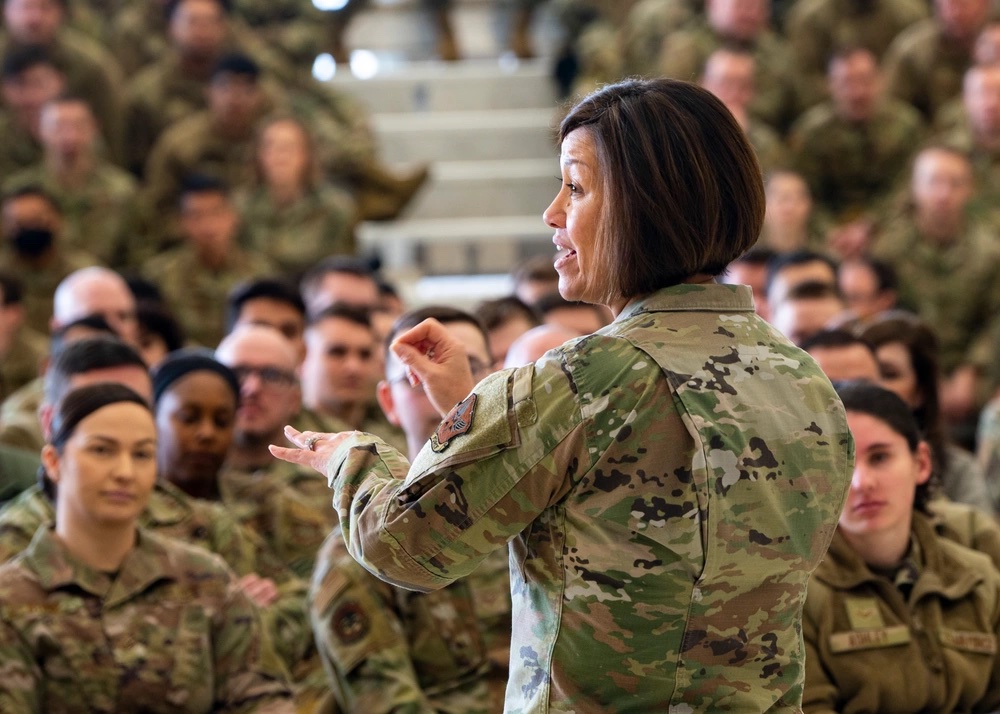Distinctive Story
Share Article
Editor’s Remember: That’s the main of a two-part sequence about Chief Grasp Sergeant of the Air Energy JoAnne Bass’ efforts to help assemble the Air Energy of the long term. Half 2 is now obtainable proper right here.
Chief Grasp Sergeant of the Air Energy JoAnne S. Bass has a protracted document of ideas to help the Air Energy increased retain its enlisted experience—nonetheless six of them significantly may be in line for movement sooner barely than later.
In a July 18 social media publish, Bass shared a list of “Points to Get After” ahead of engagements with Congress by which she and Air Energy administration share their priorities and targets with lawmakers.
The doc was in depth, overlaying higher than 20 completely completely different strains of effort, and generated a great deal of dialogue from Airmen. Nevertheless six significantly have been highlighted:
Reforming developmental explicit duties
Rising commissioning options for enlisted Airmen
Retaining technical competencies
Establishing continuation boards
Bettering the Air Energy’s activity insurance coverage insurance policies
Digitizing the Weighted Airman Promotion System (WAPS) check out
“We have got to be deliberately centered on the ability of the long term,” Bass instructed Air & Space Forces Journal in an distinctive interview, saying she highlighted these six in hopes that “we’ll set off some really sturdy momentum and get after them, possibly quicker than just a few of the completely different ones.”
Now, as Bass nears the fourth and positive ultimate 12 months of her tenure as CMSAF, she equipped notion into just a few of her prime priorities.
On July 18, Chief Grasp Sergeant of the Air Energy JoAnne S. Bass posted this image on Fb of ideas to assemble the long term Air Energy. (Image by the use of Fb, CMSAF JoAnne S. Bass)
Developmental Specific Accountability Reform
Developmental Specific Duties (DSD) are positions inside the Air Energy that play a key perform in teaching and educating recruits and Airmen, similar to recruiters, military teaching instructors, {{and professional}} military education instructors. Whereas the positions are important in rising personnel, they could possibly be a lateral career switch or maybe a step once more for the Airmen who take them on.
For example, a maintenance Airman may should take time away from maintenance work all through a DSD as a military teaching trainer whereas their mates proceed to advance. Bass needs to make sure the Airmen who serve in DSD actually really feel well-taken care of, which may hopefully make it a lot much less of a sacrifice to hold out DSD and have a optimistic affect on the work they do rising current and future Airmen.
“We now have to make it potential for we current as an Air Energy that we value our DSDs,” she acknowledged. For example, “we should make it potential for, once you’re serving as a military teaching trainer, that it is aggressive, that it is troublesome, that it is rising you nonetheless we’re moreover caring for you once you’re serving in that place.”
Significantly, Bass talked about providing base of need to DSD Airmen on the end of their explicit duties. She moreover talked about giving DSD Airmen a higher likelihood to compete for promotion all through their explicit obligation, barely than afterwards as is normally the case.
“I really feel we’ll do increased than that,” the chief acknowledged. “If the parents that we’re selecting into these explicit duties are actually the simplest of the simplest, then now we’ve a risk to compete them in opposition to their mates from their career [Air Force Specialty Codes].”
Bass moreover often called for taking an in depth check out the document of positions that rely as DSDs.
“If now we’ve too many explicit duties, then there’s nothing explicit about them,” she acknowledged. “Over time we’ve put additional explicit duties beneath the umbrella of DSD and to some extent we’ve watered it down. We’ve obtained to get once more to the core explicit duties that we think about are foundational to our institution.”
The exact plan for implementing these steps is however to be determined. For now, Bass acknowledged there is a working group studying the DSD program to produce recommendations for modernizing it. She expects to have updates on the difficulty “inside the following few months.”
“These are the parents who’re bringing people into the Air Energy and training, rising and educating them,” she acknowledged. “It should be a highly-competitive course of … how are we guaranteeing that we’re managing the experience inside these explicit duties?” U.S. Air Energy Tech. Sgt. Tavis Bell, 321st Teaching Squadron military teaching trainer, gives a command of movement to a gaggle of newest Air Energy trainees from flight 248 on appropriate drill actions at Joint Base San Antonio-Lackland, Texas, Mar. 7, 2023. (U.S. Air Energy {photograph} by Brian Boisvert)
Rising Commissioning Alternate options for Enlisted Airmen
The Air Energy desires gifted officers, and Bass acknowledged the simplest experience pool could also be found inside the service’s enlisted corps. There are a number of pathways for enlisted Airmen to price, along with Officer Teaching School, the Air Energy ROTC enlisted commissioning program, and the senior enlisted commissioning packages, which have pathways for Airmen with and with out a bachelor’s diploma.
Nonetheless, thenumber of Air Energy officers with prior enlisted service stays to be fairly small: 9,744 out of spherical 60,000, break up comparatively equally amongst these with one to 4 years of experience inside the enlisted ranks, these with 5 to eight years enlisted time, and other people with eight years or additional, in response to data equipped by Bass’ office. The chief hopes to bump up the number of enlisted Airmen who pursue the commissioned route.
“We have got such a robust experience pool contained in the enlisted energy,” she acknowledged. “My intent is de facto to solely enhance the options and raise the chances of people who already have prior enlisted experience.”
To this point, the Air Energy has tried to encourage additional enlisted Airmen to price by allowing older Airmen to take motion and by establishing a pipeline for enlisted Airmen to show into commissioned pilots. Bass did not level out explicit ideas for model spanking new pathways or new methods of encouraging additional enlisted Airmen to compete for a price, nonetheless she talked about recommendations that yearly, the number of enlisted Airmen who can compete for a price is affected by the number of civilians who direct price into the service.
“That’s just a few of the recommendations that I hear and that’s what we’re making an attempt to get after,” she acknowledged. “As we check out what kind of [company and field grade officers] we would like predominant our energy ultimately, that experience pool is inside that enlisted energy.”
Retain Technical Competencies
Bass moreover acknowledged she does not want to give enlisted Airmen who’re specialists of their space a trigger to go away the service.
“We can’t afford to lose technical competency out of our Air Energy, significantly as a result of it pertains to future battle and inside the information space and the cyber space,” she acknowledged. “To have the ability to do this, analysis should be completed on managing our experience.”
The chief acknowledged exterior suppose tanks and dealing groups inside the Air Energy are studying the best option to retain Airmen in technical career fields, significantly in cyber and data. The division has been engaged on the difficulty for years—in September, it equipped additional reenlistment bonuses for cyber Airmen even whereas slicing the inducement pay for various non-tech jobs. In 2021, the Air Energy moreover reclassified cyber enlisted Airmen as an operational perform barely than as a communications help perform. The switch was meant partially to “current manpower to help the Air Energy cyber mission,” in response to a press launch on the time.
“We’ve obtained to have topic materials specialists who maintain technical solely and by no means basically should go, for example, a administration route,” Bass acknowledged. “That’s what we’re .”
The chief acknowledged the working groups are taking an in depth check out completely completely different fashions for retaining technical specialists. She talked about that the Army, Navy, and Marine Corps have warrant officer or restricted obligation officer roles, which help retain topic materials specialists with out pushing them into strictly administration or administrative positions. Inside the Marine Corps, grasp sergeants and grasp gunnery sergeants moreover “current technical administration as occupational specialists of their explicit [military occupational specialty],” in response to the Marine Corps website.
“I really feel the Air Energy has to, as we’re rising our broader experience administration model, make it potential for now we’ve a pathway to have the power to retain our technical expertise,” she acknowledged.
When requested if the Air Energy should implement a warrant officer system, Bass acknowledged she was “positively not in opposition to the suggestion of that. We merely should do the analysis to make it potential for is what’s best for the U.S. Air Energy.”
Like with just a few of the completely different measures, there are no concrete subsequent steps laid out however, nonetheless the chief acknowledged she hopes to have progress updates inside the following few months. With all six of the priorities, her Fb publish was meant partially to help gentle a fire for sooner movement.
“That’s kind of why I’ve them highlighted,” she acknowledged. “We’ve obtained to create some momentum and start to drive in the direction of that sooner. … Our rivals are modernizing fast and time is simply not on our aspect.”



